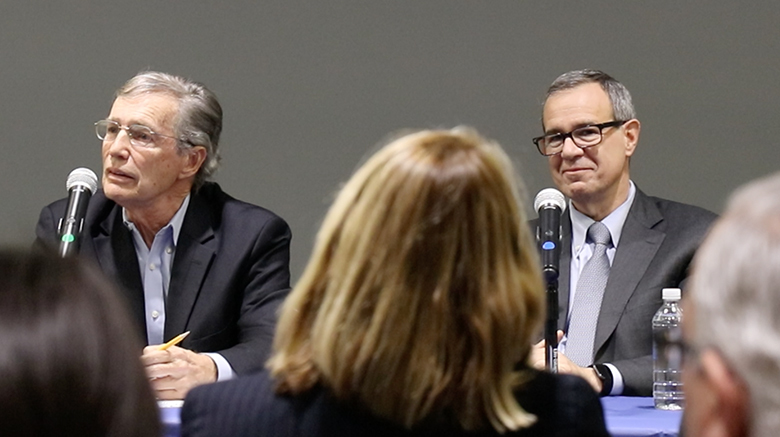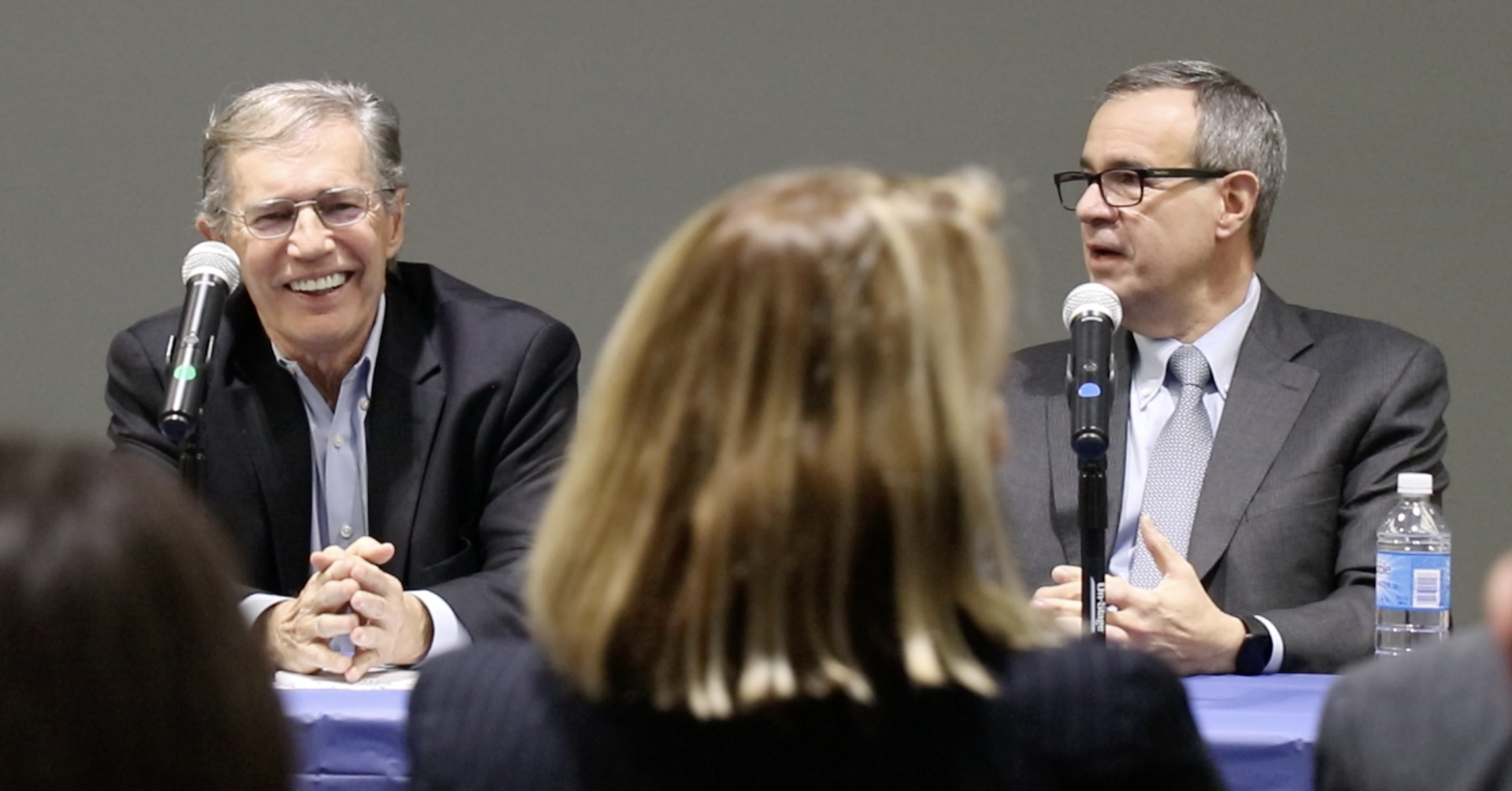 Addressing addiction, better assisting veterans and preparing for the future of health care were among the topics discussed Thursday during a health care forum at SJC Long Island.
Addressing addiction, better assisting veterans and preparing for the future of health care were among the topics discussed Thursday during a health care forum at SJC Long Island.
“We need to redefine how we talk about health care,” Mark Solazzo, Northwell Health’s executive vice president and chief operating officer, said in a discussion with John Sardelis, DrPH, associate chair and professor of health administration at St. Joseph’s College.
“The debate is always about what we’re not doing well in health care in the U.S. I’d just like to step back and have you think about what we do do.”
More than 100 people attended the event in the McGann Conference Center, including St. Joseph’s President Donald R. Boomgaarden, Ph.D.
Addressing Addiction
With drug overdoses as the leading cause of death in the United States for people under 55, Dr. Sardelis asked Solazzo how Northwell Health addresses the issue.
“In our system, we have two of the highest instances of opioid deaths in the country: Staten Island and Suffolk County,” said Solazzo, an adjunct professor at St. Joseph’s College. “As a leadership team, last year, as we were seeing this, we developed a task force across this system. They’re doing cutting-edge innovative programs, capturing patients and their families in the ERs and hooking them up with prevention and intervention right away.”
However, Solazzo explained they didn’t feel it was enough. In efforts to improve the fight against opioid-related deaths, Northwell Health began seeking public and private partnerships.
“We just developed a private partnership with a for-profit company to break ground in Calverton on an addiction hospital,” Solazzo said. “We will continue to do as much as we possibly can.”
Assisting Veterans
According to the U.S. Census, Suffolk County has the largest population of veterans among New York counties, Dr. Sardelis asked Solazzo to share what Northwell Health does to help veterans.
 “We established an Office of Veterans Affairs a dozen years ago, whose sole purpose was to help our veterans who are our employees, as well as those that are coming back from their service,” Solazzo said. “We developed a landmark program with the VA for veterans and their families.”
“We established an Office of Veterans Affairs a dozen years ago, whose sole purpose was to help our veterans who are our employees, as well as those that are coming back from their service,” Solazzo said. “We developed a landmark program with the VA for veterans and their families.”
Since the VA is not allowed by law to help family members of veterans, Northwell Health created a site in Bay Shore that had their practitioners on one side and VA practitioners on the other.
“Another thing we’re very proud of is our commitment to hiring veterans,” Solazzo said. “The other thing that we’ve challenged other businesses to do, and I’ll challenge this College to do, is helping match veterans’ salaries when they’re called to duty.”
When a veteran is called to duty, his or her pay rate drops, many times by half or more.
“We made a commitment to every veteran that works with us that is called to active duty while they’re employed by us that we’ll pay them the difference between what they’re getting for their military service and what they would normally get if they were still working for us,” Solazzo explained. “We’re very proud of that.”
Northwell Helping Others
“Public hospitals serve a lot of the underserved, and I know Northwell’s made an effort to help NUMC (Nassau University Medical Center),” Dr. Sardelis said to Solazzo. “Talk to us a little bit about what you’re doing and why you’re doing it.”
To this, Mark chuckled and replied that it’s “because of George,” referring to audience member George Tsunis, Esq., chairmen of the board at NUMC.
“NUMC is an essential health care provider for Long Island,” Solazzo said. “It serves a population that, even if we all raise our hands and say that we’ll help, will go unserved if NUMC disappeared. The nurses and the clinicians there on the floor are doing God’s work. They’re providing pretty good care with no resources, no management, no direction” Solazzo continued. “They’re on their own. George has asked us to come in and provide interim management.”
Facing the Future
 Dr. Sardelis brought up how businesses like Google, Amazon, Apple and CVS have discussed entering into the field of health care. He asked Solazzo if he’s challenged by them, if he thinks they’ll be successful, if he plans on partnering with them and how they fit into his vision of health care.
Dr. Sardelis brought up how businesses like Google, Amazon, Apple and CVS have discussed entering into the field of health care. He asked Solazzo if he’s challenged by them, if he thinks they’ll be successful, if he plans on partnering with them and how they fit into his vision of health care.
“I like the idea that they’re coming in,” Solazzo responded. “I think some of their statements are innocent and naive, but I really do like the idea of them coming in if they’re really going to. From an IT perspective, I’m going to partner with them on digital health, I’m looking to partner with them on TeleHealth. There’s tremendous opportunity to improve health care IT.”
